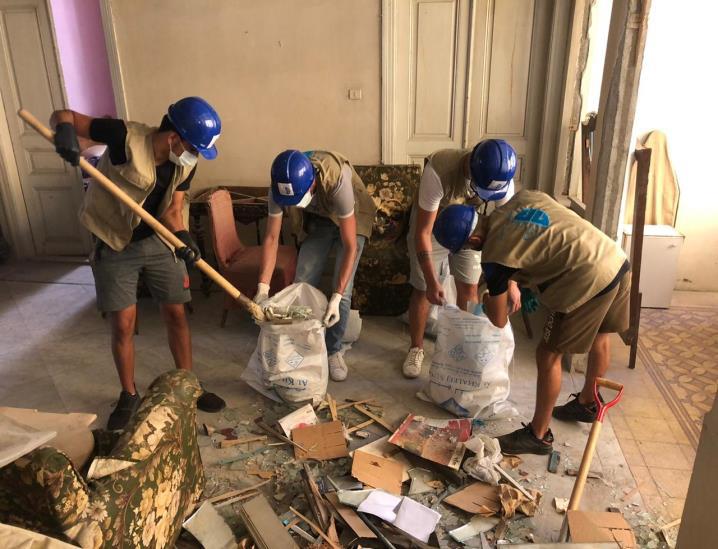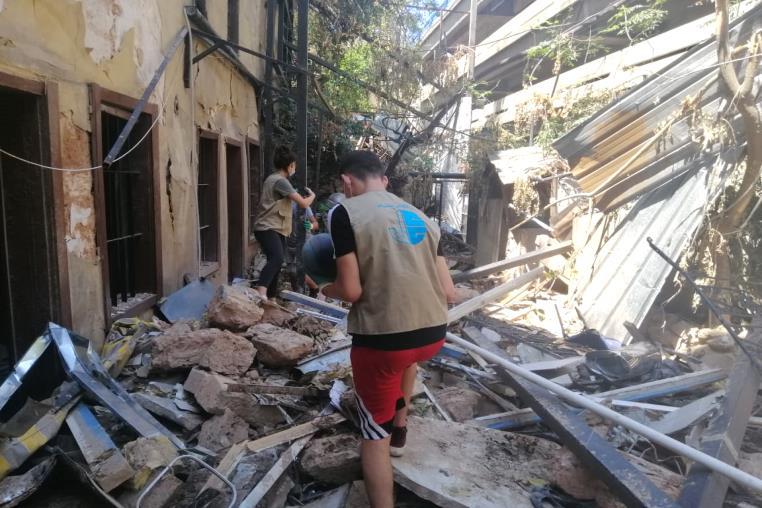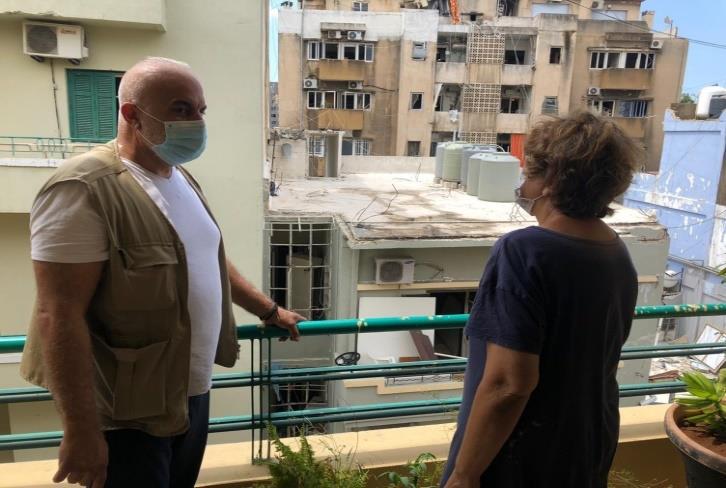A Letter from Elmarie and Scott Parker, serving in Iraq, Lebanon and Syria
October 2020
Write to Scott Parker
Write to Elmarie Parker
Individuals: Give online to E200504 for Scott and Elmarie Parker’s sending and support
Congregations: Give to D507569 for Scott and Elmarie Parker’s sending and support
Churches are asked to send donations through your congregation’s normal receiving site (this is usually your presbytery)
Subscribe to our co-worker letters
The Lebanon I returned to on August 20 is a very different Lebanon from which I left on February 27. The challenges facing all who live in Lebanon were already immense at the end of February. Between COVID-19 and the August 4th explosion, they have only multiplied in kind and severity since then.
As I’ve reconnected with partners and friends, there are two themes I regularly hear. One is the Arabic phrase, “shway shway.” It conveys various nuances of “bit-by-bit” or “step-by-step.” This is how people here are making it from one day to the next. I call it “Grace enough for the day.”
The other theme is the need for hope. As calamities pile up, hope remains the people’s anchor.
Rev. Joseph Kassab, General Secretary, National Evangelical Synod of Syria and Lebanon, based in Beirut, says it like this:
“We are really occupied with the people—how we can help them survive. The whole church is in the stage of survival, unfortunately. As if this is the fate of the Christians in the Middle East. But the role of the church in such time is to inject hope into the lives of people against despair, against darkness. And this is what we are trying to do. The church cannot generate love from itself, herself, we reflect the love we experience with Jesus. We are salt only if he salted us; we are hope only if he gave us hope; we are light if he enlighted our life. He is the source of our energy to do what we are called to do in this part of the world.”
The young adults from Dbayeh Christian Palestinian Camp, in the aftermath of the August 4th explosion, embody hope for the future in this way (shared from the Joint Christian Committee newsletter—a PC(USA) partner):“Young eyes turned to Elias Habib. The Joint Christian Committee (JCC) Youth Leader looked at about 20 youths standing before him. Shock was written all over their faces. Their hillside mountain Palestinian residences, known as the ‘Dbayeh camp,’ shook with the blast that ravaged Beirut’s port and its surroundings when a large amount of ammonium nitrate, stored at the port exploded on August 4. Over 180 people died, 6,000 were injured, and an estimated 300,000 homes were heavily damaged. Considered one of the powerful non-nuclear explosions in history, the blast was felt in Turkey, Syria, and Cyprus – more than 250km away. In Dbaye, only 11km away, buildings shook ferociously as the deafening sound drove people out of their homes in panic. News soon reached them, however, that the explosion took place at the port. In less than an hour, Habib was already calling on his youth group to get ready. “Brooms, gloves, masks,” he mentally listed…. Habib paused. As a foreman on many construction sites and as someone who grew up in the vicious Lebanese 16 -year civil war, Habib could forecast what awaited them. But this youth group, aged from 16 to 24, had yet to see such ferocious destruction or, even worse, feel the misery of hurt ones.
Nevertheless, a few days later, the JCC located and settled in a small destroyed restaurant in the Mar Mikhael neighborhood – just one of several areas in the Ashrafieh region affected by the blast. They cleared out the debris and set up base. They soon joined the hundreds of volunteers who descended to the devastated areas, sweeping glass shards, setting aside torn doors and windows, and scrubbing blood off walls and floors. Since Lebanese government officials were absent in the field, it was up to the volunteers to help the distraught victims and salvage whatever they could from the debris. It was an overwhelming and emotional task, but aware that his youth group was watching his every move, Habib grabbed a thick bristled broom and matter-of-factly began to sweep one of the devastated homes. The youths quietly followed suit…
Day after day, the JCC group put up nylon sheets across windows and balcony doors and hauled down the stairs hundreds of bags filled with debris… But there was more than that. They were Palestinians (albeit Christians) – a word which, for years, brought contempt in many Christian circles. Indeed, many massacres and battles were committed by both groups against each other – Christian and Palestinian militias – during the Lebanese civil war. Habib’s father was severely injured during such fighting. Habib himself fled from area to area to escape the clashes.
The JCC Palestinians were too young to realize the irony: they were aiding the very people who once upon a time were the enemies of their parents’ and grandparents.’…
‘You are Palestinians?’ said one older woman, as the group hauled out the debris from her home. ‘And from the camp?’ Habib nodded slowly. The JCC youngsters looked oblivious to the question. They smiled cheerfully. The woman looked at the youths.‘The government hasn’t been to ask about me,’ she said. ‘They didn’t come to clean my home and help me. But you did.’ She paused, then looked at Habib.‘Curse the war,’ she said.‘You are my brother.’”
Multiple calamities face many of our communities—certainly here in the Middle East, but also in the United States. Our partners here regularly ask how you all are doing. They are standing in prayerful solidarity with you. As the hymnist wrote, “When all around my soul gives way, Jesus is then my hope and stay (Edward Mote).” May all of our anchors “hold within the veil” as we each seek to embody Christ’s hope to those around us.
Thank you for your continuing partnership with us through prayer, emails, invitations to zoom gatherings, collaborating with partners on projects, and financial gifts. We’re grateful to be on this journey with you.
On Christ’s Way,
Scott and Elmarie Parker
![]() You may freely reuse and distribute this article in its entirety for non-commercial purposes in any medium. Please include author attribution, photography credits, and a link to the original article. This work is licensed under a Creative Commons Attribution-NonCommercial-NoDeratives 4.0 International License.
You may freely reuse and distribute this article in its entirety for non-commercial purposes in any medium. Please include author attribution, photography credits, and a link to the original article. This work is licensed under a Creative Commons Attribution-NonCommercial-NoDeratives 4.0 International License.
Tags: August 4th explosion in Beirut, Christian survival, Christians in the Middle East, COVID-19, Dbayeh Christian Palestinian Camp, General Secretary, hope in times of despair, Joint Christian Committee, lebanon, National Evangelical Synod of Syria and Lebanon, reflect the love of Jesus, Rev. Joseph Kassab
Tags: Elmarie Parker


